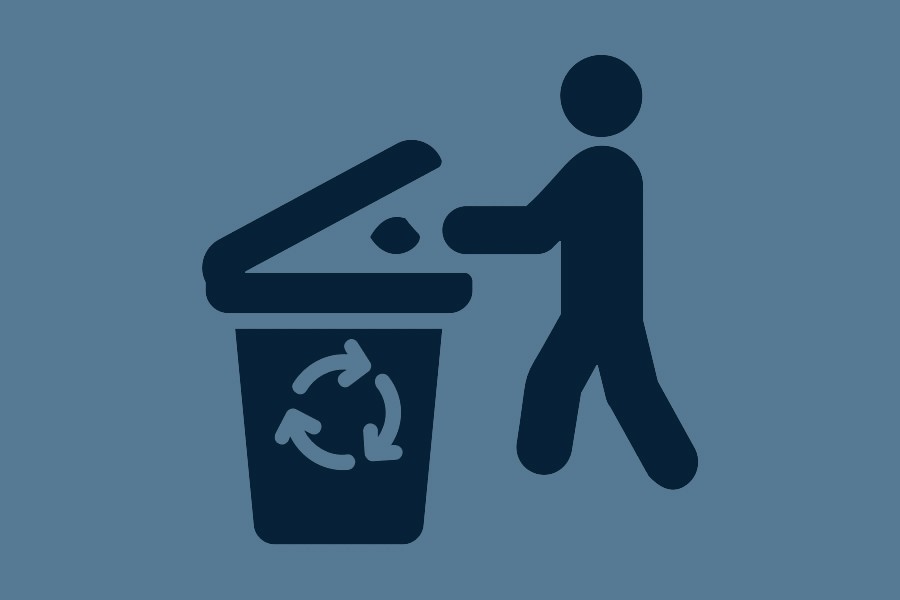Solid waste management for smart and sustainable cities

Mowshumi Sharmin and Sima Rani Dey
Published :
Updated :

The 92-page election manifesto of the country's ruling party ahead of the parliamentary election last year had the prime slogan "My village - My town". It was the first time in the history of Bangladesh that urbanisation was given such political worth. Besides other facilities, developed sewage and waste management was a priority in the manifesto. Against this backdrop, for effective planning and management of waste, reliable data on a national level on waste generation, composition and management is needed.
Though a nationwide waste statistics in general is lacking in case of Bangladesh, studies on waste management postulates that municipal solid waste from developing countries are mainly produced from households (55-80 per cent), followed by commercial or market areas (10-30 per cent) with varying quantities from streets, industries, institutions and many more. Solid waste management (SWM) is challenging for the municipal authorities largely due to the escalating production of waste. The burden is imposed on the municipal budget due to high costs linked to its management, lack of awareness over a diversity of issues that affect the different stages of waste management and association necessary to enable functioning of the entire handling system.
Increasing economic growth coupled with rapid urbanisation, industrialisation, improved living standards and population growth -- both in developed and developing countries-- are challenges to the proper management of urban solid waste.
According to the Economist Intelligence Unit (2018), Dhaka is the second 'least liveable city in the world' after Damascus, Syria. Solid waste management is internationally recognised as an indicator of a city's liveability. SWM is prerequisite for a healthy life; smart, sustainable and cleaner city and lastly, for better environment. The country is generating roughly 8,000 tons of solid waste every day from the six major cities and Dhaka city alone is contributing about 70 per cent. The country's increase in solid waste is projected to be 47,064 tons/day and per capita 0.06 kg/day by 2025.
In case of composition, the total waste chain comprise 74.40 per cent organic matter, 9.10 per cent paper, 3.50 per cent plastic, 1.90 per cent textile and wood, 0.80 per cent leather and rubber, 1.50 per cent metal, 0.80 per cent glass and 8.0 per cent other wastes, mainly from domestic, commercial, industrial, street sweeping, healthcare facilities and others. From these, domestic sources are the leading producers of waste. According to the World Bank and USAID, developing countries can use 20-50 per cent of their existing municipal budget on solid waste management which can serve less than 50 per cent of the entire population.
The potential of proper waste management for smart cities in remediating environmental problems is very essential. Even though there is evidence of adverse health outcomes for the general population living near landfill sites, incinerators and composting facilities are usually insufficient and inconclusive. There is convincing indication of a high risk of gastrointestinal problems associated with pathogens originating at sewage treatment plants. Incidence and prevalence of diseases -- such as malaria and respiratory problems as well as other illnesses -- through the contamination of ground water is also very common.
Ensuring efficient and effective SWM for the entire population is a daunting task for the government with its limited financial and organisational capacity. The government is trying to improve the regulations for standard of waste collection, transportation, recycling, incineration, disposal, landfill and usage. Lack of awareness, inappropriate choice of technology, reluctance to store waste separately, and insufficient financial support are the major constraints for SWM in Bangladesh. Here, a centralised waste management system is very necessary.

Wastes can be turned into resources. Waste should be stored and collected separately to avoid mixed waste sorting cost and resource recovery mechanism i.e. methane (CH4) collection, which is a main constituent of natural gas, should be present for optimum utilisation of solid waste.
Moreover, decent work environment for waste workers with necessary equipment, municipal leadership, separate budget for SWM, private sector, community and NGOs participation are indispensable for SWM in a smart and sustainable city. Persuasive instruments to change public attitudes through adoption and implementation of proper policies and rules are likely to promote good practices under a hygienic SWM system.
Mowshumi Sharmin is Assistant Director (Research) at Bangladesh Institute of Governance and Management (BIGM).
mowshumi405@gmail.com;
Sima Rani Dey is Assistant Professor at Bangladesh Institute of Governance and Management (BIGM).
simabd330@gmail.com


 For all latest news, follow The Financial Express Google News channel.
For all latest news, follow The Financial Express Google News channel.